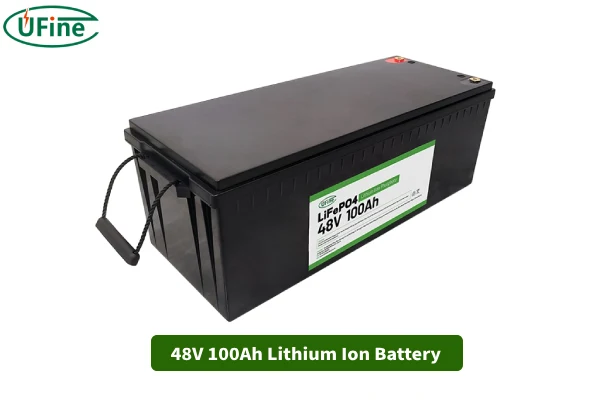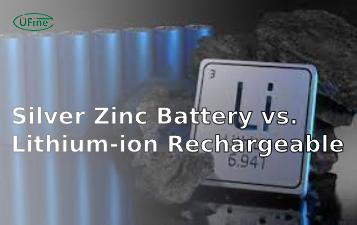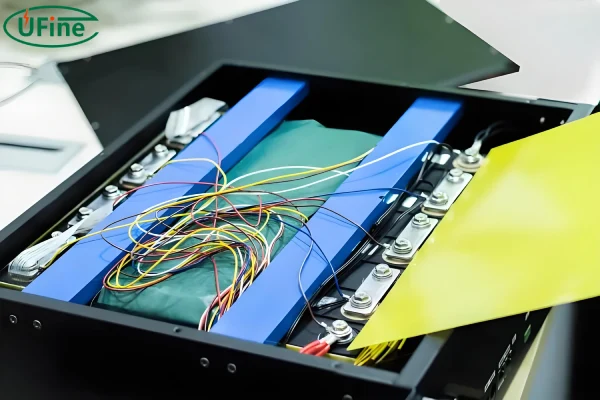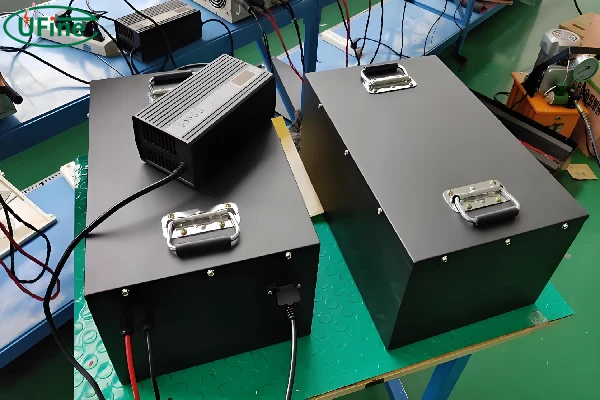
- Part 1. What is a 48V 100Ah lithium ion battery?
- Part 2. How many kW is a 48V 100Ah battery?
- Part 3. Why choose the 48V 100Ah LiFePO4 battery?
- Part 4. Is 48v lithium battery better than lead-acid battery?
- Part 5. Price
- Part 6. Applications
- Part 7. How long will a 48V 100Ah lithium battery last?
- Part 8. How long to charge a 48V 100Ah lithium battery?
- Part 9. Best performance 48v 100ah battery
- Part 10. Ufine Battery: your reliable li-ion battery supplier
- Part 11. Maintenance and care tips
- Part 12. Common issues and solutions
- Part 13. FAQs
Part 1. What is a 48V 100Ah lithium ion battery?

Let’s start by breaking down what each part of “48V 100Ah lithium ion battery” means:
- 48V: This refers to the voltage of the battery. Voltage is crucial because it determines the electric potential difference and the amount of power the battery can supply. A 48V battery is quite powerful and can handle significant loads.
- 100Ah: This stands for ampere-hour, which measures the battery’s capacity. A 100Ah battery can deliver 100 amps of current for one hour, or 10 amps for 10 hours, and so on. The higher the ampere-hour rating, the longer the battery can provide power.
- Lithium Ion: This indicates the battery’s chemistry. Lithium-ion batteries are famous for their high energy density, low self-discharge rate, and long cycle life. They are commonly used in portable electronics, electric vehicles, and renewable energy systems.
Lithium-ion batteries consist of cells connected in series and parallel configurations to achieve the desired voltage and capacity. They use lithium ions to move between the anode and cathode, allowing them to store and release energy efficiently.
Part 2. How many kW is a 48V 100Ah battery?
To determine the kilowatt (kW) rating of a 48V 100Ah battery, you can use a simple formula:
kW=Voltage (V)×Capacity (Ah)×1/1000
kW=48×100× 1/100 =4.8kW
This means the battery can provide 4.8 kilowatts of power, making it suitable for high-power applications.
Part 3. Why choose the 48V 100Ah LiFePO4 battery?
The 48V 100Ah LiFePO4 battery is a specific type of lithium-ion battery that uses lithium iron phosphate (LiFePO4) as its cathode material. Here are several reasons why this battery is a superior choice:
- Safety: LiFePO4 batteries are known for their thermal and chemical stability. They are less likely to overheat or catch fire compared to other lithium-ion batteries.
- Longevity: These batteries offer a longer cycle life, often exceeding 2000 cycles. This translates to several years of reliable service, even with regular use.
- Efficiency: LiFePO4 batteries have high discharge and recharge efficiency, ensuring that more of the stored energy can be used effectively.
- Environmental Impact: These batteries are more environmentally friendly, containing fewer hazardous materials and offering safer disposal.
- Maintenance: LiFePO4 batteries require minimal maintenance, reducing hassle and long-term costs.
Part 4. Is 48v lithium battery better than lead-acid battery?
When comparing lithium-ion batteries to traditional lead-acid batteries, it’s clear that the former has several advantages. First and foremost, lithium-ion batteries like the 48V 100Ah model boast a higher energy density. This means they can store more energy in a smaller, lighter package. As a result, users can experience longer operational times without the need for frequent recharging. In addition, lithium-ion batteries offer faster charging times compared to lead-acid batteries, saving valuable time for those in critical applications, such as off-grid solar systems or electric vehicles.
Moreover, lithium-ion batteries are more durable. They have a much longer lifespan, typically lasting between 3,000 to 5,000 charge cycles, while lead-acid batteries usually only last around 500 to 1,000 cycles. This significant difference in longevity makes the 48V 100Ah lithium-ion battery a more cost-effective solution over time.
Furthermore, lithium-ion batteries have a higher round-trip efficiency, meaning that more of the energy stored in the battery can be used compared to lead-acid batteries, which tend to waste more energy during charge and discharge cycles. This efficiency advantage allows users to get more value from their investment in a 48V 100Ah lithium-ion battery.
Part 5. Price
The price of a 48V 100Ah lithium ion battery can vary widely based on the brand, quality, and specific features. On average, you can expect to pay between $700 and $1500. As technology advances and production scales up, prices have been decreasing, making these powerful batteries more accessible to a broader range of consumers.
Part 6. Applications
The versatility of the 48V 100Ah lithium battery means it has a wide range of applications, including:
- Solar Energy Systems: Perfect for storing solar energy for residential or commercial use, providing a reliable energy source even when the sun isn’t shining.
- Electric Vehicles: Ideal for electric cars, bikes, and scooters due to their high energy density and long cycle life.
- Uninterruptible Power Supplies (UPS): Ensures that critical systems remain operational during power outages, providing peace of mind for both homes and businesses.
- Marine Applications: Powers boats and other watercraft efficiently, withstanding the harsh conditions of marine environments.
- Recreational Vehicles (RVs): Provides reliable power for all your travel needs, ensuring a comfortable and convenient experience on the road.
- Industrial Equipment: Powers heavy machinery and tools, supporting various industrial applications with high energy demands.
Part 7. How long will a 48V 100Ah lithium battery last?
The lifespan of a 48V 100Ah lithium battery depends on several factors, including usage patterns, charging habits, and environmental conditions. Typically, these batteries last between 5 to 10 years. LiFePO4 batteries, in particular, can endure over 2000 charge cycles, translating to a longer lifespan compared to other lithium-ion batteries. Proper maintenance and optimal charging practices can further extend the battery’s life.
Part 8. How long to charge a 48V 100Ah lithium battery?
The charging time for a 48V 100Ah lithium battery depends on the charger’s power output. Using a standard 10A charger, it would take approximately 10 hours to fully charge the battery. Faster chargers can reduce this time, but it is essential to ensure the charger is compatible with the battery to avoid damage. High-quality chargers designed specifically for lithium-ion batteries are recommended to ensure safety and efficiency.
Part 9. Best performance 48v 100ah battery
When evaluating the best 48V 100Ah lithium-ion battery for your needs, there are several key performance parameters to consider. These include charge time, discharge rate, cycle life, and efficiency. The best batteries in this category typically offer fast charging times (usually around 4-6 hours), minimal loss of energy during charge and discharge cycles, and a long lifespan of 3,000-5,000 cycles.
Additionally, it’s essential to check the battery’s temperature tolerance, as batteries that operate efficiently in a broader temperature range tend to be more reliable in various environments. A battery with a high tolerance to extreme heat or cold will perform more consistently and last longer.
Part 10. Ufine Battery: your reliable li-ion battery supplier
When considering purchasing a 48V 100Ah lithium-ion battery, Ufine Battery stands out as a top provider. As a well-known custom lithium-ion battery manufacturer based in China, Ufine Battery offers high-quality, customized solutions tailored to your needs. Whether you require different sizes, shapes, voltages, or capacities, Ufine Battery provides a wide range of products, including lithium-polymer batteries, 18650 batteries, LiFePO4 batteries, and more. Contact us now to learn how we can meet your energy storage needs with precision.
Part 11. Maintenance and care tips
Proper maintenance of your 48V 100Ah lithium-ion battery is crucial for maximizing its lifespan and ensuring optimal performance. Here are some essential maintenance and care tips:
1. Avoid Extreme Temperatures
Lithium-ion batteries perform best at moderate temperatures, typically between 20°C to 25°C (68°F to 77°F). Extreme heat or cold can damage the battery and shorten its lifespan. Ensure that your battery is stored and operated in a temperature-controlled environment.
2. Regular Charging
Avoid letting the battery completely discharge before recharging it. Lithium-ion batteries are best maintained when they are kept between 20% to 80% of their total capacity. Consistently discharging them to 0% can lead to premature wear.
3. Keep Terminals Clean
Dirty or corroded terminals can cause poor conductivity and reduced efficiency. Regularly inspect the battery’s terminals and clean them with a soft cloth or brush to prevent build-up.
4. Use a Proper Charging System
Always use the correct charger designed for your 48V 100Ah lithium-ion battery. Using an incompatible or low-quality charger can result in overheating, reduced charge efficiency, or even damage to the battery.
5.Monitor Battery Health
Some advanced 48V lithium-ion batteries come with built-in battery management systems (BMS) that can help track the battery’s health and performance. Regularly monitor these metrics to ensure the battery is functioning optimally and address any irregularities early on.
Part 12. Common issues and solutions
While 48V 100Ah lithium-ion batteries are known for their durability, they may encounter some common issues over time. Here are a few potential problems and their solutions:
1.Battery Not Charging Properly
If the battery isn’t charging, the issue could be with the charger, the battery’s connection, or the Battery Management System (BMS). First, ensure the charger is functioning correctly. If the charger is working fine, inspect the battery terminals for corrosion or looseness. If the problem persists, the BMS may need to be reset or replaced.
2. Short Battery Life
A 48V 100Ah battery should typically last for several thousand charge cycles. If your battery is losing capacity too quickly, it could be due to overcharging, deep discharges, or exposure to extreme temperatures. Make sure to maintain the battery within its optimal voltage range (usually between 20%-80% charge) and avoid exposing it to excessive heat or cold.
3. Battery Overheating
Overheating can occur due to poor ventilation, excessive load, or using a charger that isn’t designed for the battery. Ensure that the battery is placed in a well-ventilated area and that it’s not being subjected to temperatures beyond its rated limits. If overheating occurs, disconnect the battery and allow it to cool before using it again.
4. Low Voltage or Inconsistent Power Output
If the battery is showing low voltage or inconsistent power output, it might be due to a faulty BMS or damaged cells within the battery pack. In this case, contact the manufacturer or a professional technician for further diagnosis and repair.
5. Excessive Self-Discharge
Lithium-ion batteries are known for their low self-discharge rates, but if the battery is losing charge unexpectedly when not in use, it could indicate an internal fault. This issue may require professional inspection or replacement of the affected cells.
Part 13. FAQs
-
What is the expected lifespan of a 48V 100Ah lithium-ion battery?
A 48V 100Ah lithium-ion battery typically lasts between 3,000 to 5,000 charge cycles, depending on usage and maintenance. Proper care can help extend the lifespan even further. -
Can I use a 48V 100Ah lithium-ion battery for an off-grid solar system?
Yes, the 48V 100Ah battery is an excellent choice for off-grid solar systems, providing sufficient storage for energy generated during the day to power your home at night. -
How much power can a 48V 100Ah battery provide?
A 48V 100Ah battery can provide up to 4,800 watt-hours (Wh) of energy. This means it can power a 1,000-watt device for about 4.8 hours, or provide energy to smaller devices for a longer period. -
Can I connect multiple 48V 100Ah batteries in parallel or series?
Yes, you can connect multiple 48V 100Ah lithium-ion batteries in parallel or series, depending on your power requirements. When connected in parallel, the battery capacity increases, and when connected in series, the voltage increases. -
Is it safe to discharge a 48V 100Ah lithium-ion battery completely?
It’s not recommended to fully discharge a lithium-ion battery to 0%. Deep discharges can damage the cells and shorten the battery’s lifespan. Aim to recharge the battery when it reaches around 20% to 30% of its total capacity.
Related Tags:
More Articles

What is the Difference Between Silver Zinc Battery vs. Lithium-ion Rechargeable?
Compare silver zinc and lithium-ion rechargeable batteries: energy density, cycle life, safety, cost, and uses in drones, medical devices, EVs, and electronics.
What are Watts and Watt Hours in Battery?
Understand watt vs watt-hour in batteries: key differences, how to calculate capacity, and why they matter. Includes free comparison table.
Best 10 Blood Pressure Monitor Battery Review: Finding the Most Reliable
Are you looking for a reliable Blood Pressure Monitor battery? Here is a complete guide with the top 10 best blood pressure monitor batteries.
Bluetooth Headphone Battery Guide: All You Need to Know
Maximize headphone battery life with expert tips! Learn how to charge, check, troubleshoot, and choose the best bluetooth headphone battery in 2025.
LiFePO4 Battery VS. Lithium-ion Polymer Battery: Which One Is Best?
Comprehensive comparison of LiFePO4 vs Lithium Ion Polymer batteries: energy density, safety, lifespan, cost. Find out which battery suits your needs in 2025.




